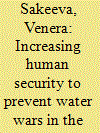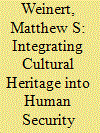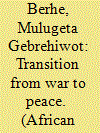|
|
|
Sort Order |
|
|
|
Items / Page
|
|
|
|
|
|
|
| Srl | Item |
| 1 |
ID:
127594


|
|
|
|
|
| Publication |
2013.
|
| Summary/Abstract |
The Ferghana Valley is shared by three Central Asian republics of Kyrgyzstan, Uzbekistan, and Tajikistan. Largely agrarian, the communities residing in the area are heavily dependent on the availability of water for irrigation. As a result of Soviet-backed imaginary border removal and the creation of new borders, the communities became highly vulnerable to state policies and are challenged in establishing relations with each other. The deteriorated environmental conditions, such as dry climate and drought, have only fueled the competition among households to ensure their access to the scarce water resources. Without timely and comprehensive intervention strategies, the region can be compared to a time bomb that could have irreversible consequences.
This article will examine the water problem in the Ferghana Valley from the perspective of a human security approach. In particular, it will analyze the trilateral spurious relations among environmental, economic, and community insecurities derived from the scarcity of water resources and lack of comprehensive water management strategies. To elaborate, it will look into how environmental insecurity has multidimensional impacts on economic and community security in the Ferghana Valley. This research with go on to identify the existing approaches to addressing the aforementioned issues and will scrutinize them to see whether or not they address human security of the communities residing in the Ferghana Valley. Subsequently, the article will propose an alternative solution that meets the principles of human security-friendly policies and will discuss strategies to improve alternative intervention within the framework of "do no harm."
|
|
|
|
|
|
|
|
|
|
|
|
|
|
|
|
| 2 |
ID:
184093


|
|
|
|
|
| Summary/Abstract |
The UN Development Programme introduced the human security concept in 1994 to address the diversity of challenges to people’s survival, livelihood, and dignity in seven key areas: personal, food, health, economic, political, community, and environmental security. A voluminous literature has since engaged its definitional parameters, theoretical implications, and practical applications. Yet neither dignity nor community security, defined in part to include cultural traditions and identities, have attracted much attention despite considerable human and community insecurities caused by assaults on cultural heritage which, as emblematic of distinctive cultural identities, have downward effects on dignity. This article aims to correct that gap. It identifies and examines three security markers to ascertain and redress the sufferance of indignities and insecurities pertaining to heritage, dignity, and community security: ensuring use of heritage; promoting its transmission; and protecting and advancing cultural rights.
|
|
|
|
|
|
|
|
|
|
|
|
|
|
|
|
| 3 |
ID:
154377


|
|
|
|
|
| Summary/Abstract |
The objective of this paper is to chronicle the 1991 to 1997 Ethiopian disarmament, demobilisation and reintegration (DDR) experience in the context of Ethiopia’s transition from war to peace. The DDR project is usually a post-conflict political project that should be analysed in the overall context of transition from war to peace. The literature on the Ethiopian experience is focused on the technical aspects of the programme and the assessment of its impacts, with little to no attempts made to capture the experience in the context of Ethiopia’s transition from war to peace. Given that there are many existing and several incoming post-conflict countries, capturing the successful Ethiopian DDR experience is important, as some aspects will inform the design of ongoing and upcoming transitions from war to peace. This paper illustrates the wider challenges of the transition from war to peace as a context for the DDR programme, delves into the key strategies and elements of the programme, and summarises its impact assessment. In the conclusion, the key lessons to be learned from the experience are laid out.
|
|
|
|
|
|
|
|
|
|
|
|
|
|
|
|
|
|
|
|
|